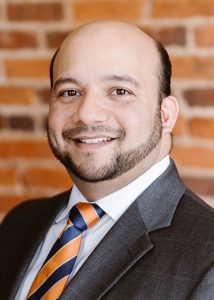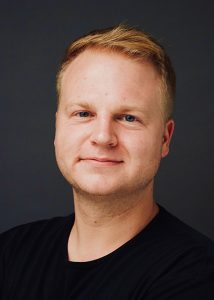Dr. Asim Ali

As the Executive Director of the Biggio Center for the Enhancement of Teaching and Learning, Dr. Asim Ali advances the center’s mission of providing professional development programs, services, and resources to enhance instructional innovation and support scholarly and creative activities. Ali oversees a team of more than 90 professionals, graduate students, and staff members across the center’s various units, which include Auburn Online, educational development, instructional technology, testing services, and Engaged and Active Student Learning, or EASL, classrooms, and classroom buildings.
Dr. Ali co-leads Auburn’s augmented and virtual reality initiative, AUX, in collaboration with the Office of Information Technology. Dr. Ali also leads work on artificial intelligence for the Office of the Provost and the AI@AU Initiative to build capacity for understanding and implementing AI in teaching and learning.
As the founding Director of Auburn Online from 2014-2019, Dr. Ali strengthened the University’s role in eLearning by providing central resources to support faculty in the development and instruction of online education, expanding the University’s online course offerings by more than 300 percent. Under Dr. Ali’s leadership, Auburn Online launched the institution’s first fully online degree completion programs in 2018. In addition, Dr. Ali and his staff recently worked with faculty to develop support services and courses for Auburn First, the University’s revised dual enrollment program.
In addition to his administrative responsibilities, Dr. Ali teaches introduction to information systems management in the Harbert College of Business in the Department of Business Analytics and Information Systems. He is active in several professional organizations, including serving as an executive board member of UPCEA, the leading national organization for online learning and administration.
Dr. Ali holds a bachelor’s degree in software engineering, a master’s degree in information systems management, and a Ph.D. in adult education from Auburn University. He lives in Auburn with his wife and three children.
Hagan Walker

Hagan Walker is the Co-founder and CEO of Glo® – an idea turned company that was born out of a classroom project at Mississippi State University. After graduating in 2015, Hagan turned down an offer with Tesla Motors to pursue Glo® full-time, patenting a liquid-activated light up circuit, which is the main technology behind Glo’s two brands, Glo Cubes® and Glo Pals®.
Glo Cubes® are liquid-activated light up drink cubes and Glo Pals® are liquid-activated light up sensory toys for children. Since inception in 2016, Glo® has sold more than 4 million products to customers in 36 countries and their products can be found in more than 1,400 retailers throughout the North America, including Macy’s, Nordstrom, SeaWorld, and many others.
Hagan is a private pilot, has skydived more than once, and has a 11-year-old Irish Setter named Canelo.
Glo® is based in Starkville, Mississippi where all products are developed, packaged, and shipped. The company now has 27 employees and recently moved into their new corporate headquarters – a $1.4 million renovation of an historic theater in downtown Starkville, Mississippi. Glo was just named number 282 on the Financial Times Fastest Growing Companies in America.

